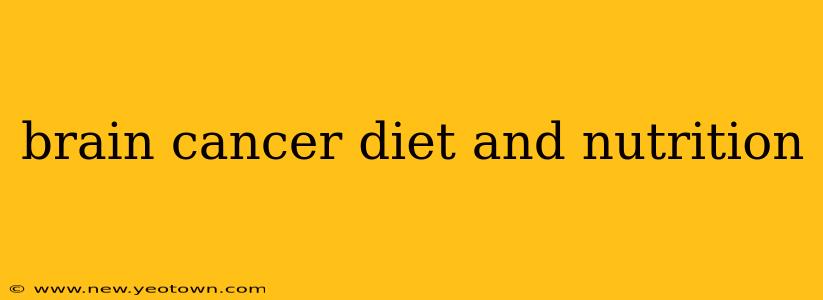The diagnosis of brain cancer is a challenging journey, filled with complex treatments and emotional upheaval. While there's no single diet that cures brain cancer, focusing on proper nutrition can significantly impact a patient's quality of life, potentially boosting their immune system and managing treatment side effects. This isn't about miracle cures; it's about supporting the body's natural healing processes during a difficult time. This article explores the crucial role of diet and nutrition in managing brain cancer and addresses some common questions.
What are the best foods to eat during brain cancer treatment?
This isn't about a restrictive diet, but rather a focus on nutrient-dense foods that provide the building blocks for repair and resilience. Think vibrant colors and diverse sources of essential nutrients. Prioritizing these foods can make a real difference:
- Fruits and Vegetables: Loaded with antioxidants, vitamins, and minerals, they fight free radicals and support overall health. Aim for a rainbow of colors – berries, leafy greens, broccoli, carrots – to maximize the variety of nutrients.
- Lean Protein: Crucial for repairing tissues and supporting the immune system. Good sources include fish (rich in omega-3 fatty acids), chicken, beans, lentils, and tofu.
- Whole Grains: Provide sustained energy and fiber, which is essential for digestive health, often compromised by treatment side effects. Opt for brown rice, quinoa, oats, and whole-wheat bread.
- Healthy Fats: Essential for brain function and hormone production. Include avocados, nuts, seeds, and olive oil.
Remember, portion control is important, even with healthy foods. Consulting a registered dietitian or oncology nutritionist is crucial to create a personalized plan that addresses individual needs and potential dietary restrictions caused by treatment.
What foods should I avoid with brain cancer?
Just as important as what to include is what to limit or avoid. These foods may exacerbate side effects or hinder the body's ability to fight the disease:
- Processed Foods: High in unhealthy fats, sodium, and preservatives, these offer little nutritional value and can contribute to inflammation.
- Sugary Drinks and Sweets: These provide empty calories and can lead to energy crashes and weight gain.
- Red and Processed Meats: Some studies link high consumption of these meats to an increased risk of certain cancers. Moderation or elimination is often recommended.
- Excessive Alcohol: Alcohol can interfere with treatment and weaken the immune system.
Can diet help prevent brain cancer?
While no diet guarantees prevention, a healthy lifestyle that emphasizes whole, unprocessed foods, regular exercise, and limited alcohol consumption significantly reduces the risk of many cancers, including brain cancer. This proactive approach supports overall health and well-being.
What are the benefits of a brain cancer diet?
A well-planned diet offers several benefits beyond just nutrition:
- Improved Immune Function: Nutrient-rich foods strengthen the immune system, enabling the body to better combat the disease and side effects of treatment.
- Reduced Treatment Side Effects: Proper nutrition can help mitigate common side effects like nausea, fatigue, and mouth sores.
- Enhanced Energy Levels: A balanced diet provides sustained energy, combating the fatigue often experienced during cancer treatment.
- Improved Quality of Life: Focusing on nutrition empowers patients to take an active role in their care, improving their overall well-being and sense of control.
Does a specific diet cure brain cancer?
It's crucial to understand that no specific diet cures brain cancer. Diet is a supportive element in the overall treatment plan. It works alongside medical interventions like surgery, chemotherapy, and radiation therapy, not as a replacement.
What about supplements? Should I take them?
The use of supplements should be discussed with your oncologist or a registered dietitian. Some supplements might interact with medications, and others may not be beneficial or even harmful. Always prioritize whole foods as the primary source of nutrition.
Disclaimer: This information is for general knowledge and does not constitute medical advice. Always consult with your healthcare team before making any changes to your diet or treatment plan. They can provide personalized guidance based on your specific circumstances and medical history. A registered dietitian specializing in oncology nutrition can be an invaluable resource in navigating the complexities of nutrition during cancer treatment.

